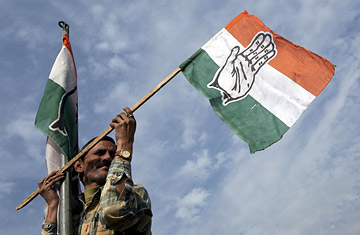
A worker installs a flag of India's ruling Congress party on top of the party's headquarters in Jammu, India
A month before Delhi voters went to the polls in late November, the two leading parties were busy whipping up support across the city. The Congress Party's grandmotherly and capable Sheila Dixit, already two-time chief minister, was running on a plank of progress and development. The Bharatiya Janata Party's V.K. Malhotra, a staid party veteran, urged Delhi to vote for him so he could fight terrorism.
At that point, things weren't looking good for Dixit's Congress. Added to the fact that she was the incumbent in a country where the anti-incumbency vote regularly determines elections, Dixit had to explain away national issues like the economic slowdown and rising inflation. Then there were local factors like the soaring crime rate and the fact that Delhi had been hit by a series of lethal bomb blasts in September. But just three days before Delhi's voters cast their ballot, terrorists struck Mumbai. When Congress, which also controls India's national government, reluctantly confessed to lapses in security, many predicted the party was doomed. (See pictures of Mumbai picking up the pieces.)
Not quite. In the five states where results are now known, Congress has won in three. In Delhi, it has won 42 seats against the BJP's 23, and Dixit has secured a rare third term. Voters, pollsters surmised, had decided that local issues and not terrorism mattered most.
Each state voted on a unique basket of factors, says political analyst Jyotirmaya Sharma. In Rajasthan, charges of authoritarianism and corruption against the BJP's incumbent Chief Minister Vasundhara Raje Scindia cost the party office, while in Chhattisgarh, BJP head Raman Singh's populist policies won the day.
In Delhi, it was Congress' ability to appeal to urban voters and the BJP's lack of a coherent plan for the city that determined the election. "The Congress led a very positive campaign," says Shivani Singh, metro editor at the Hindustan Times. "They highlighted the development and progress Delhi has seen under Dixit — cleaner air due to CNG [compressed natural gas] in mass-transport vehicles, flyovers, the Delhi metro, air-conditioned buses..." Singh believes the Congress' progress card appealed to the growing middle-class. "The Congress and Dixit's own upper-middle-class, English-speaking personality appealed to the aspirations of the young, of middle-class housewives, of a city that aspires to be more cosmopolitan," she says.
The BJP, on the other hand, "didn't seem to have a plan for Delhi. OK, so there are traffic jams, but what's your alternative? They didn't offer any solution." Many voters were put off by the BJP's blatant use of terrorism to garner political capital, including placing ads in Delhi newspapers saying: Brutal Terror Strikes at Will. Weak Government. Unwilling and Incapable. Fight Terror. Vote BJP. "Their attempts boomeranged," says political analyst Sharma.
But terrorism hasn't disappeared completely from people's minds, and though inflation is down to single digits after crossing 12% in August, the economic slowdown is beginning to bite. Next year's general election is still wide open. "People do vote very differently in state and general elections," says Manoj Joshi, a political analyst and prominent journalist. "State elections are mostly decided by local issues. It is unclear how the terror issue will play out by then, but if anger persists, voters may yet punish the Congress in general elections."
